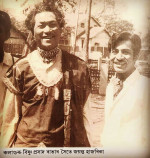Life & Legacy
His music and songs, popularly known as "Bishnu Rabha Sangeet," continue to resonate with generations. He was not just a performer but a man whose art was inseparable from his activism.
A Revolutionary Mind with a Socialist Vision
From a young age, Bishnu Rabha participated actively in the freedom movement. A supporter of leftist ideology, he aligned himself with the Communist Party of India and later joined the Revolutionary Communist Party of India (RCPI).
His idea of freedom extended far beyond liberation from British rule. He envisioned a classless society, free from capitalism, poverty, and exploitation. His iconic slogan “Haal Jaar Maati Taar” (“The land belongs to those who till it”) became a rallying cry for agrarian reform.
In a remarkable act of solidarity, he donated 2,500 bighas of ancestral land to landless peasants — the same land where Tezpur University stands today.
Contribution to Assamese Theatre and Cinema
Bishnu Rabha played a pioneering role in the Assamese theatre movement, closely associated with the iconic Ban Theatre of Tezpur. He was a renowned actor, director, music composer, and playwright, never swayed by commercial success. Despite opportunities in Kolkata and Bombay, he chose to stay in Assam, using his talent to educate and empower the masses.
His involvement in Assamese cinema includes:
-
Film Director: Siraj
-
Actor: Era Bator Sur, Pratidhwani
-
Collaborator: Assisted Jyoti Prasad Agarwala in making Jaymati, the first Assamese film
Master of Dance: The Tandava Virtuoso
His mastery in Tandava dance earned him the title "Kalaguru", conferred by Dr. Sarvepalli Radhakrishnan in Varanasi. He was hailed as the embodiment of Nataraja, mesmerizing even dance legends like Uday Shankar.
The message of destruction of social evils through Tandava was deeply ingrained in his spirit. He was not just performing art but living it as a form of resistance and awakening.
Bishnu Rabha Sangeet: Songs of the Soul
The musical legacy of Bishnu Rabha lives on through Rabha Sangeet. His compositions like:
-
"Xurore Deulore"
-
"Bilote Halise"
...are timeless classics, echoing the ethos of the Assamese people. These songs are a staple in Assamese cultural festivals and competitions, symbolizing heritage, emotion, and revolution.
Scholar, Writer, and Assam’s First Anthropologist
Apart from his artistic achievements, Bishnu Rabha was a serious academician and anthropologist. His book "Bano Kobang" remains a landmark study of Assam’s ethnic communities. Other notable literary works include:
-
Sonpahi
-
Asomiya Kristir Samuh Abhash
-
Mising Coneng
-
Atit Asom
Sadly, many of his academic contributions were recognized only posthumously.
Awards, Legacy & Commemoration
To honour his unmatched contributions, the Government of Assam instituted the Kalaguru Bishnu Rabha Bota — a prestigious award for excellence in the cultural and musical fields.
To commemorate his life, the Bishnu Rabha Smriti Udyan has been established on the banks of the Brahmaputra in Tezpur, near Bhairabi Temple — an initiative led by his son Hemraj Rabha.
Bishnu Rabha Divas – Honouring a Legend
Bishnu Rabha passed away in 1969, but his influence is eternal. Every year, 20th June is celebrated as “Bishnu Rabha Divas” across Assam, paying tribute to this iconic cultural warrior and visionary leader.
Conclusion
Kalaguru Bishnu Prasad Rabha was more than a performer or politician — he was a revolution in motion. A cultural torchbearer, a voice of the voiceless, and a symbol of Assamese pride, Rabha’s legacy is immortal. His life reminds us that art, when fused with social purpose, can ignite movements, transform communities, and inspire generations.





